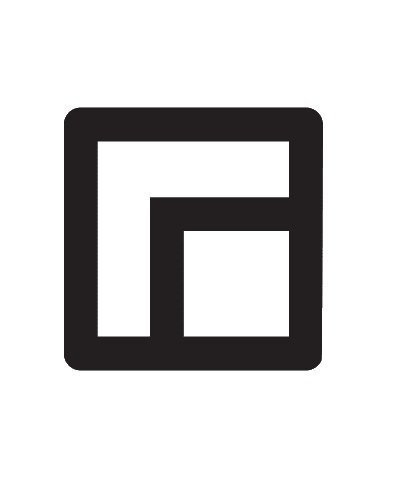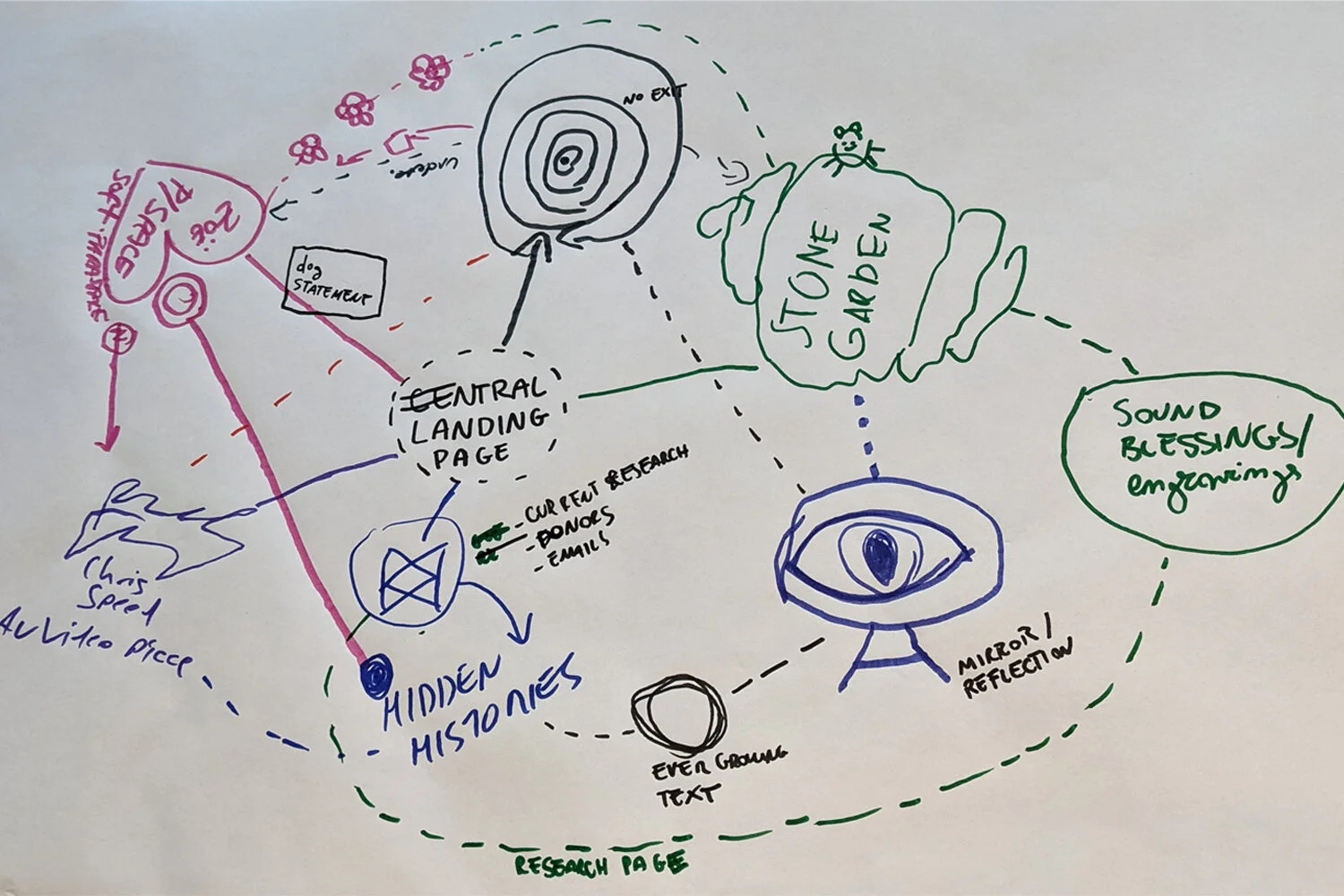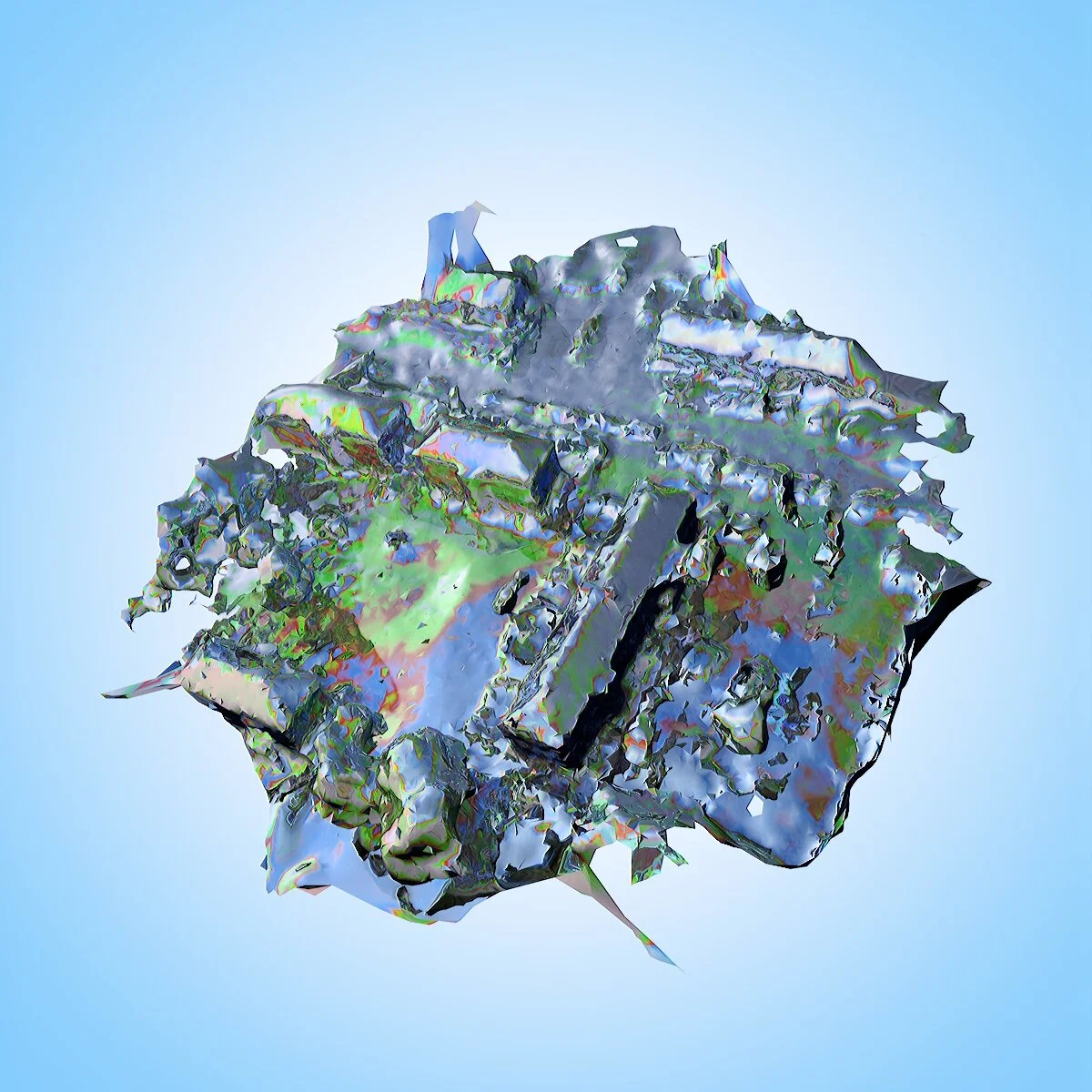Goldsmiths University Computing Department Residency
Paraspaces
Residency runs 13 September - 11 October
Part of arebyte 2021 programme Realities
arebyte in collaboration with Goldsmiths University, invites students and alumni from Goldsmiths Computing Department from a variety of different programs including; BSc Digital Arts Computing, MA/MFA Computational Arts, MA/MSc Virtual & Augmented Reality, PhD Researcher IGGI CDT and PhD Researcher Art and Computational Technology, to take part in a 4-week residency around arebyte’s 2021 theme Realities.
During the 4-week period, students will experiment with the idea of a residency and public-facing outcomes. The residency aims to be transparent and open to the public via unconventional and disruptive methods of collaborative making. The driving motivation of the residency is to allow students the opportunity to challenge the idea of what a gallery is and what it can offer, as well as experimenting beyond the white cube space and context through a dedicated and sustained pedagogical framework.
Residency members are artists Pietro Bardini, Kris Cirkuit (Kris Hillquist), Jonas Grünwald, George Kuhn, Felix Loftus, Alexander MacKinnon, Rohan Mathur, Nahab (James Treagus), Zoë O’Shea, Chris Speed, Szonja Szendi, Samuel Antonio Turner, and Han Yajuan.
The group have entitled their collective, multi-authored residency Paraspaces which offers up a series of open, loosely connected online spaces in which their expanded residency will take place.
Their constantly evolving description of these ‘Paraspaces’ has been made through cooperation with a machine-learning model. Residency members feed the GPT-2 algorithm prose in which they write about ideas around Paraspaces, then in response, the algorithm generates text and completes their sentences. Borrowing from cut-up techniques used in literacy and music composition, these statements act as a living, responsive archive, always in a state of flux - reflecting the developing nature of the residency model itself. The current version reads as follows:
Paraspaces are an emergent property of swarm behavior, rising out of our collective belief. Through communal engagement: be it from semi-anonymised forum posters; neural network-powered bots; or anonymised non-profits, Paraspaces emerge often, and without a trace. Layers of woven realities, drifting off…
The residency traces mycelial links between Paraspaces, following evidence of lost civilisations through deserted forums, esoteric institutions and the occasional small-scale internet connection - an exercise in distributed para-cartography. Will the lines drawn and the values found be real, whole or just holes?
Mind-map of Paraspaces, Goldsmiths university residency workshop at arebyte Gallery, 2021.
The students will look to this evolving statement as a way of creating works that seek to define, relate to, broaden, and maximise the concept of the Paraspace through online and real interactions. This methodology of process addresses the spatial and temporal dislocations that come with living in and living with networks of information, data, and systems.
Using a combination of mixed reality, web interventions, live performance, alternative display, writing, bots, the unreliable narrator and digital folklore, each student presents themselves as an individual and as a collective entity within the residency structure. Basing this structure around the cut-up technique, the students’ work, ideas and tangible outcomes weave in and out of each other, forming a mass of information unfolding as workshops, writing exercises, live public performance, published discussions and shared experiences. These outcomes seek to overload and estrange the senses as a way to comment on the incongruous juxtapositions present within the Paraspace.
Samuel A. Turner, animation of Paraspaces landscape, 2021.
Chris Speed Visuals, Derived (work in progress), 2021.
Events Programme
All events are free and will be live-streamed through the Paraspaces website with tech support from Chris Speed.
Opening Ceremony
Sun 3 Oct 21, 4pm - 6pm BST
The Paraspaces residency will begin its public program with a live-streamed ritual. Participants in the residency will each leave an object that is meaningful to them in some way. The resulting collection of objects constitutes a shrine, manifesting a sense of generous and creative exchange among the participants. The shrine will continue to be streamed for the duration of the residency.
Group Reading and Discussion - Xenofeminist Manifesto (with Samuel A. Turner)
Wed 6 Oct 21, 3:30pm - 4:30pm
Paraspace inhabitants will jointly read and reflect upon the chapters and sections of Laboria Cuboniks’ ‘Xenofeminist Manifesto: A Politics for Alienation’. The manifesto begins: “Ours is a world in vertigo. It is a world that swarms with technological mediation, interlacing our daily lives with abstraction, virtuality, and complexity. XF constructs a feminism adapted to these realities”.
Artistic Process Building Non-places in Blender (with Alexander MacKinnon)
Wed 6 Oct 21, 7pm - 8pm BST
Liminal space imagery often gives a sense of haunting nostalgia to locations similar to what anthropologist Marc Augé calls ‘Non-places’. In this session Alexander will be streaming part of their artistic process building virtual liminal spaces and non-places in the Blender 3D software.
Photogrammetry Workshop - Approaches to Digitising the Real World (with Samuel A. Turner)
Thur 7 Oct 21, 5pm - 6pm BST
Photogrammetry is the method of turning images of something in the real world into a digital 3D model. This workshop focuses on how to use various photogrammetry programs (ranging from free to cheap or affordable), how to develop the models into workable spaces/platforms, and ways to use them conceptually or in creative processes.
Effective Pressure Point Design in Gaming (with Han Yajuan)
Fri 8 Oct 21, 9am - 10am BST
Building the bridge between the virtual and real world one moment at a time. A drop in chat to explore soul searching moments in game design. What’s an effective way for people to carry experience from gaming to the real world? How to help shape people’s perspective in moving from gaming to reality?
Parasites and Space - Drop-in Chat (with George Kuhn)
Fri 8 Oct 21, 7pm - 8pm BST
An informal run-down on the meaning of parasite and the relationships between parasites and space. These topics will be tackled by a free discussion of parasite stories; mice feasting on leftovers, mitochondria sheltering in host cells and swarms of internet users and forum mods.
Democratising Tools of Production in the Digital Age (with Samuel A. Turner)
Sat 9 Oct 21, 2:30pm - 4pm
This workshop will go through a range of tools, programs, and methodologies with the aim of making digital production more affordable, accessible, and democratic in our contemporary age of technological and financial inequality. Visitors are invited to contribute if they would like. Core topics covered will be 3D modelling design, photogrammetry, audio and video editing, graphic design approaches, virtual and augmented reality, presentation methods, tools for collaborative digital communication, etc and not entirely legal methods of obtaining software and materials.
Sound Blessings I – Live Tour of Discovery Site: Middlesex Filter Beds (with Pietro Bardini)
Sat 9 Oct 21, 5:30pm - 6pm BST
In several of London’s nature reserves, below layers of dirt, stones have been found engraved with unidentified marks. This guided tour will take you to the Middlesex Filter Beds discovery site. This is part of an ongoing research sponsored by the Lambent Institute.
Talks From My Kitchen (with Kris Cirkuit)
Sun 10 Oct 21, 4:30pm - 5pm BST
A short series of short talks from Kris’ kitchen in which they explore and discuss their artistic process. A chilled out, not overly academic reflection on their work.
Sound Blessings II – Live Tour of Discovery Site: Epping Forest (with Pietro Bardini)
Sun 10 Oct 21, 5:30pm - 6pm BST
In several of London’s nature reserves, below layers of dirt, stones have been found engraved with unidentified marks. This guided tour will take you to the Epping Forest discovery site. This is part of an ongoing research sponsored by the Lambent Institute.
Guest Respondents Event(s)
Mon 11 Oct 21, 10:30am - 4:30pm BST
The Paraspaces residency will culminate its public program with a series of discussions covering constructed realities. Paraspaces is interested in investigating the patchwork of spaces marked off in radical ways; by the inhabitants’ engagement with their environments, by digital architectures or the codes of conduct that delimit participation in a space. Paraspaces will reach out to a range of visitants, allowing them to respond to the prompt ‘constructing realities’ in whatever way they feel most comfortable. The residency’s dwellers will then use these responses as a catalyst for a series of discussions on each response covering the diverse realities our guests inhabit and shape to contribute toward the programme at large. The day will finish with a roundtable attempting to integrate and reconcile the different ideas around reality explored throughout the day. Respondent events will take place starting at 10:30, approximately 45 minutes each.
Artists:
Pietro Bardini is an artist working with sounds and computation. His compositional systems explore the interactions between organic and inorganic entities and exist on the boundaries between the animate and inanimate. Pietro approaches composition as a living entity that shapes and gets shaped by the environments it inhabits. His performances and installations have been shown at Barbican Centre, Borough Road Archive, The Crypt Gallery, Guest Projects, MK Gallery, LOA Gallery, University of Birmingham and IKLECTIK.
Kris Cirkuit is a multidisciplinary artist. Their current practice works with themes around shifting class identity, memory and unreliable narrators, and gentrification of the urban environment. Their recent focus has involved creating computational audio-visual pieces, and live performance. They have exhibited work under their given name of Kris Hillquist on numerous occasions both on and offline, including as part of the "Bedlam and Beyond" exhibition at the Welcome Museum, the "Outsider" exhibition at The Hackney Museum, "Who Took My Legs" at Deptford Does Art. They also produce electronic music and run the underground record label and creative agency Cirkuit42.
Jonas Grünwald is a German multidisciplinary practitioner, working collaboratively across the wider fields of media art, technology and conceptual design. His artistic practice explores the relationship between humans and networked technological frameworks through 'Internet Archeology', and processes of automated and organic discovery of elements and their relationships, as well as the development of unconventional tools and interfaces between humans and the digital domain. In collaboration with other artists and designers, he creates web and physically-based spaces and experiences as part of self-directed and commissioned projects, in addition to helping run the type platform and foundry 'Gruppo Due' as a founding member.
George Kuhn is a computational artist and researcher interested in technological ecosystems. His work is focussed on symbiosis and time in multi-species systems. In his practice he uses ad-hoc mixtures of theory, fiction and art to explore technological ecosystems, following stories of biochemical innovation across deep time, plants terraforming their environments, bacterial warfare and internet extinction events.
Felix Loftus is a computational artist and researcher from London who works with digital environmental photography and interactive storytelling. His work is concerned with human relations to the land, to food, and to the more-than-human, how these relations are entangled with colonial and imperial logics, and how creative practitioners can use storytelling and speculative creative methods for upsetting these oppressive structures. In his creative computing practice he uses creative sensing and game design for multispecies restor(y)ation, and creates photographic narrative games about privatised land in the UK. He researches and writes about carceral optics and logics in environmental technologies, contemporary movements towards de-enclosure and emergent urban commons. He is an active member of tech and housing justice organising groups and works. Felix is currently undertaking an MA at Goldsmiths in Computational Arts and is a resident at the Sustainable Darkroom and the Grad Scholar in Residence at the Environmental Media Lab.
Alexander MacKinnon is a British-Chinese artist based in London. Alexander’s practice predominantly focuses on creating simulated 3D spaces and experimental video games. Within these virtual realms Alexander’s work presents warped perspectives of human experience – often drawing on ideas of Posthumanist virtuality and the Uncanny to explore the dissolution of reality in postmodern culture, and narratives that reflect dystopic parallels to the real world.
Rohan Mathur is a new media artist and creative practitioner interested in exploring the boundaries of narrativity through experimental game design, video art and sound art. His work engages with concepts including the materiality of networks and the digital, extended cognition and assemblage theory.
Nahab is a visual artist and researcher exploring the relationships between technologies and contemporary knowledge making through the methodology of infrastructural performance. Beginning from a post-factual position which regards mythology, conspiracy and esotericism as technologies in their own right, Nahab seeks to understand the ways in which they can be used to do work in the world when they are freed from the truth/lie dichotomy. Not simply content to pose the question, Nahab takes a more confrontational stance, which is at its heart, concerned with developing practical tools to get things done. Nahab has been exhibited at the National Gallery and Sotheby’s, and currently has work awaiting publication with Routledge examining the intersection of afro-futurism and genre horror.
Zöe O’Shea is an Irish freelance games designer and artist working on understanding the player and user experience through game design frameworks and psychology. She is especially interested in areas of inclusive design, diverse narratives and soft, playful aesthetics. Endlessly curious about the meaning and value that technology can bring to the world, Zoë firmly believes in the importance of creating joyful, human experiences.
Rising record producer and multimedia artist Chris Speed Visuals (CSV) has unleashed torrents of genre-bending releases via various outlets including the revered Sheffield label Off Me Nut and emerging imprints Cherche Encore, Human Error and The Games We Play. Born and raised in London, CSV began solely as a digital artist but his musical output gradually evolved over the years. His dark underground sound comes from teens spent immersed in the sounds of dingy East London club nights. Drawing on a myriad of influences including grime, jungle, dubstep and other extensions of the hardcore continuum, CSV also utilises a combination of hardware synthesisers and generative composition in his music, making for boundary-pushing results. His graphical aesthetic uses similar computational approaches to the music, consistent across artwork, music videos and virtual worlds. Equally at home creating installations for gallery spaces as mixing rhythms on the dance floor, CSV has worked with a variety of clients from Mixmag to Adidas and performed at numerous venues across the UK.
Szonja Szendi is an interdisciplinary artist existing on the borders of perceived realities. Their work of life is innately expressive, often poetic, and it revolves around seeking meaning and understanding through the points of connection in-between seemingly closed off and ever-growing life systems and the mystery and beauty of act that is inherently human. Involving mainly - but not solely - photography, digital painting and illustration, poetry and fiction into their practice, Szonja aims to explore the hidden, the abstract and the transparent, with the intention to evoke concealed emotions, and to bring forth a certain type of comfort (acceptance) and curiosity towards the contradictory and the unknown. Through their practice and research, most recently they have been focusing on personal and group identities, social norms and rules (especially around gender) and their systems in work, the concept of freedom, and nonlinear, spherical thinking (opposed to the linear and the binary).
Samuel Antonio Turner is an interdisciplinary artist, writer, and creative technologist based in London and specialising in virtual reality and expressions of cybernetic existentialism. A British-Colombian immigrant raised in South-East Asia and the Arabian Peninsula, their work hones in on the fragility and intimacies of human experience to explore themes of heterotopic and anthropological (non-)space, digital and bodily dysphoria, the intricacies and expression of cross-cultural identities, and delicacies of post-capitalist nostalgia.
Han Yajuan is an artist and researcher focusing on exploring the relationship between females and the virtual space in relation to agency and cognitive transformation. Her PhD research at Goldsmiths aims to investigate alternative approaches for women empowerment within paradigms of the game language, immersive technologies and arts.







